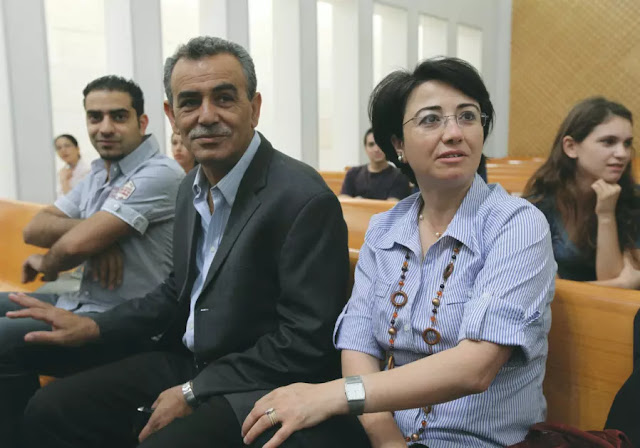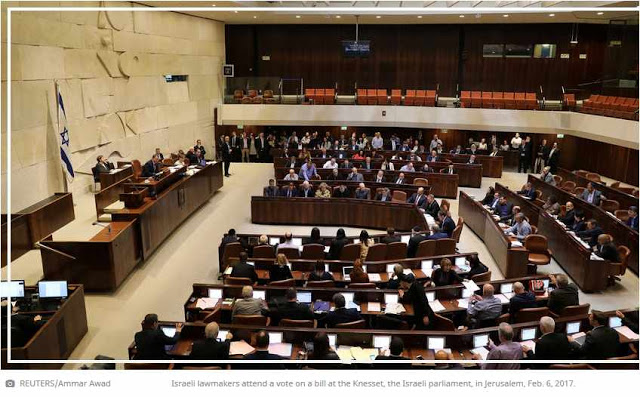As long as Israel is a Jewish
state it can’t be a democratic state
 |
| JAMAL ZAHALKA and Haneen Zoabi. (photo credit: MARC ISRAEL SELLEM/THE JERUSALEM POST) |
When the three members of Balad in the
Knesset proposed a Bill calling for Israel to be a state
of all its citizens rather than a Jewish state, all hell broke loose. The Knesset Praesidium, a Committee
responsible for the conduct of parliamentary business refused even to table it
for debate – an extremely unusual occurrence – the first time this has occurred
in this Knesset.
hostility. Possibly the most ludicrous
comment of all was from Zionist Union (Labour) MK Revital Swid:
Knesset’s table may set a precedent for placing other inherently racist bills
on the Knesset table,”
citizens without making any religious or national distinctions is apparently ‘racist’. Clearly the word ‘racist’ has taken on an
entirely new meaning in this Alice in Wonderland parliament. Usually racism means discrimination against
someone on the grounds of race, religion etc.
In Israel it means not discriminating against them.
that everyone has a vote in Israel. This is, however deliberately disingenuous
in a state where Arabs are in a permanent minority and apart from the Communist
Party all parties are either Arab or Jewish. The Israeli state is specifically constructed
in order that Jews have a permanent majority. The definition of a Jew can be as
flexible as racial demographics allow but the key unwritten assumption is that
Arabs can never become a majority.
by the former leader of the Israeli Labour Party, Isaac Herzog:
about a decade, the Arabs between the Jordan and the Mediterranean will be a
majority and the Jews a minority. The Jewish national home will become the
Palestinian national home. We will be again, for the first time since 1948, a
Jewish minority in an Arab state. I want to separate from the Palestinians. I
want to keep a Jewish state with a Jewish majority. I don’t want 61 Palestinian
MKs in Israel’s Knesset. I don’t want a Palestinian prime minister in Israel. I
don’t want them to change my flag and my national anthem. I don’t want
them to change the name of my country to Isra-stine. (my emphasis)
1968, spoke about the Black man having the whip hand over the white man’ people understood
that this was an appeal to the basest racial prejudice yet such sentiments as
the leader of the Israeli Labour Party expressed are par for the course in Israel. Israeli politics are based not on class but on a racial division between Jew and Arab.
Greater Israel in all but name. There is
no Green Line dividing pre-1967 Israel from the Occupied Territories. Yet in the West Bank there are two sets of
laws – military law for the Palestinians and normal Israeli law for the
settlers. In Israel’s general elections
the half a million settlers can vote but those living under occupation have no
vote. If they did then Palestinians
would be in the majority and Herzog’s nightmare would come true.
 |
| Thousands of Palestinian citizens of Israel take part in the March of Return, in the lands of the destroyed village of Hadatha, near Tiberias, April 23, 2015. (photo: Omar Sameer/Activestills.org) |
ever greater scrutiny, so too is its claim to be a democracy conferring equal
rights on all citizens
extraordinary lengths to craft an image of itself as a “light unto the
nations”.
razed houses of 750,000 Palestinians it exiled in 1948. Soldiers in the “most
moral army in the world” reputedly cried as they were compelled to shoot Palestinian
“infiltrators” trying to return home. And all this occurred in what Israelis
claimed was the Middle East’s “only democracy”.
Jews in Israel and abroad to a campaign to persuade the world that the
Palestinians’ dispossession was for the good of mankind. Israel’s achievements
in science, agriculture and medicine were extolled.
unravelling. Phone cameras now record “moral” soldiers executing unarmed
Palestinians in Gaza or beating up children in Hebron.
driven Israel’s right wing into even greater defiance and self-righteousness.
It no longer conceals its goal to aggressively realise a longed-for “Greater
Israel”.
far less noticed. It too is stubbornly committed to its ideological legacy –
the creation of a supposed “Jewish and democratic state” after 1948.
territories is under ever greater scrutiny, so too is its claim to be a
democracy conferring equal rights on all citizens.
 |
| Haneen Zoabi of Balad |
the remnants of those who survived the expulsions required for its creation.
Although Palestinian citizens have the vote, it was an easy generosity after
Israel gerrymandered the electoral constituency in 1948 to ensure Palestinians
remained a permanent and decisive minority.
confined to ghettos on a tiny fraction of land while Israel has “nationalised”
93 per cent of its territory for Jews around the world.
under military rule, the Palestinian minority has gradually grown more
confident in highlighting Israel’s political deficiencies.
measures before parliament to explode the illusion that Israel is a
western-style liberal democracy.
keep Palestinian lawmakers out of any of Israel’s complex but entirely Zionist
coalition governments.
major international Zionist organisations like the Jewish National Fund (JNF)
and the Jewish Agency.
obligated through their charters to discriminate in allocating state resources
and rights to Jews around the world rather than to Israelis. The aim is to
exclude Palestinian citizens from major state benefits.
communities exclusively for Jews, while the Jewish Agency restricts immigration
and associated perks to Jews alone.
one fifth of Israel’s citizenry – was defeated when all the Jewish parties
voted against it. Zuheir Bahloul, the sole Palestinian legislator in Zionist
Union, the centre-left party once called Labour, was furiously denounced by
Jewish colleagues for breaking ranks and voting for the bill.
frontrunner to become the next chair of the Jewish Agency. Israel’s left still
venerates these organisations that promote ethnic privileges – for Jews – of a
sort once familiar from apartheid South Africa.
separate bill requiring that for the first time the principle of equality be
enshrined in all 11 Basic Laws, Israel’s equivalent of a constitution. The
proposal was roundly defeated, including by his own party.
Jewish state into a state of all its citizens, representing all equally. In a
highly irregular move, a committee dominated by Jewish legislators voted to
disqualify the bill last week from even being allowed a hearing on the
parliament floor.
would alter Israel’s character by giving Jewish and Palestinian citizens “equal
status”. Knesset Speaker Yuli Edelstein called the bill “preposterous”. “Any
intelligent individual can see it must be blocked immediately,” he said.
exposed Israeli democracy as “fundamentally flawed”.
of the inequities contained in nearly 70 Israeli laws that, according to
Adalah, a legal rights group, explicitly discriminate based on ethnicity.
years as Adalah and others have challenged Jewish privileges in the courts.
threatened racist practices through new legislation – secure that an
intimidated supreme court will not dare revoke the will of parliament.
state is not the liberal democracy they imagined – have hurried to join the
right in silencing critics and implementing harsher repression.
demonstrators in Gaza by army snipers were assaulted in police custody last
month. One arrested civil society leader had his knee broken. There have been
barely any objections, even on the left.
denied entry. Unarmed Palestinian demonstrators have been gunned down in Gaza.
And critics inside Israel are silenced or beaten up.
might burst the bubble of illusions and threaten Israelis’ sense of moral
superiority.
Knesset blocks bill to deem Israel ‘state for all its citizens’
presented by the Arab Joint List redefining Israel as the state of all its
citizens.
 |
| REUTERS/Ammar Awad Israeli lawmakers attend a vote on a bill at the Knesset, the Israeli parliament, in Jerusalem, Feb. 6, 2017. |
debate proposed bills and disqualify them before they are even put on the
agenda. However, this happened June 4 when the Knesset Presidium decided in “an unusual move,” by its own
admission, to reject the submission of a proposed constitutional law sponsored
by three members of the Balad faction within the Arab Joint List. Their proposed
basic law, titled “State of all its citizens,’’ sought to redefine the
character of the Jewish state, qualifying it as giving equal status to the Jewish nationality and the Arab
nationality.
Knesset Speaker Yuli Edelstein said this was the first time
since he took office five years ago that he had recommended vetoing proposed
legislation, adding that the presidium had not vetoed a single proposed bill in
the current Knesset or in the previous one.
“The three [Knesset members] from Balad keep trying to
garner votes through provocation,” Edelstein stated, “and we cannot lend a hand
to this.” Has he really forgotten the embarrassing provocation to which his
Likud Party colleague Culture Minister Miri Regev subjected him on Israel’s
recent Independence Day celebrations? When she hijacked the traditional keynote
address at the ceremony from the speaker for Prime Minister Benjamin Netanyahu,
was Regev not trying to “garner votes” among Likud members? Does Edelstein not
know of any Jewish lawmakers who submit bills in order to pick up votes?
“Placing this bill on the Knesset’s table may set a precedent for placing other
inherently racist bills on the Knesset table,” said Knesset member Revital Swid
of the center-left Zionist Camp. Swid was one of seven presidium members who
voted to disqualify the proposed law. Only two presidium members (both Arabs),
Esawi Frej of the left-wing Meretz Party and Ahmed Tibi of the Joint List,
voted “nay.”
What was the issue that so riled Jewish lawmakers from the
coalition and opposition parties? Why did this proposal make them bare their
teeth? What is that “precedent for other inherently racist bills” to which Swid
referred? Can they be referring to a clause in the bill that recognizes the
existence and rights of the two national groups — one Jewish, one Arab — living
in the State of Israel? Perhaps the problem lies in its proposed system of
government based on separation of religion and state, while ensuring freedom of
worship for all religions? Or were they beside themselves over language
stating, “The state shall respect the individual and collective identity of its
citizens on an equal basis, without discrimination on the basis of nationality,
race, religion, gender, language, color, political views, ethnic origin or
social status”?
Indeed, the proposed law is not Zionist. Its sponsors seek
to nullify the right of return that grants automatic citizenship to all
Jews and to change the symbols and anthem of the state so that they provide
equal expression to both nations living in Israel. What racist overtones does
it contain that are any different from the ones enshrined in the proposed nationality
law that enjoys the support of Netanyahu and most members of the ruling
coalition? The proposed nationality law seeks to define the character of the
state through constitutional-style legislation that fails to guarantee the
human rights of all the country’s citizens, chief among them the right to
equality, the right to language, culture and minority rights. The proposed bill
enshrines racial segregation in housing and undermines the rights of
one-fifth of the country’s citizens to their language, culture and identity.
“There is something highly embarrassing in viewing Israel’s
definition as a state of all its people as undermining the fundamental
principles of our system of government and therefore disqualifying it in
advance,” wrote leading legal scholar Mordechai
Kremnitzer in Haaretz on June 5. Kremnitzer, a professor emeritus of the
Faculty of Law at the Hebrew University of Jerusalem, said, “If this is not an
obvious fact, there is something fundamentally flawed in our democracy.” The
latest Peace Index, issued this week, indicates that almost half
of all Israelis (41%) think the country’s democracy is under severe threat.
That view is held by 75% of those defining themselves as left wing and 70% of
the Arabs polled.
To protect the state from any hint that its Jewish
character and symbols are being eroded in favor of the principle of equality,
most Knesset members are willing to destabilize one of the central pillars of
democracy. At the same time, these same lawmakers support policy and
legislation that deprives Israel of its Jewish majority. Since the seating of
the current Knesset, 31 bills have been submitted calling for the direct
annexation of Israeli settlements in the occupied territories, whether by
annexing the entire West Bank, annexing blocs of settlements or imposing Israeli planning and construction laws on
extensive areas outside sovereign Israel. It is only thanks to human rights
organizations that refuse to give in to the campaigns of incitement being waged
against them that the Regularization Law, designed to authorize the
establishment of settlements on private Palestinian lands, is now under
deliberation by the Supreme Court.
In addition to the moral, security and diplomatic cost
being exacted by the settlements on Israel, they are forcing the state to
choose between turning into a binational state or an apartheid regime.
According to data presented to the Knesset by military authorities in March,
Arabs outnumber Jews in the area under Israeli control between the
Mediterranean Sea and the Jordan River — 6.8 million Arabs versus 6.5 million
Jews. The latest violence along the border with Gaza clearly demonstrates that
Israel’s unilateral withdrawal from the enclave in 2005 failed to sever it from
Israel, which continues to control its air space, territorial waters, supply of
goods, water and power.
The Jewish majority in the Knesset can violate the right of
Arab lawmakers to submit a bill seeking to define Israel as a state of all its
citizens, even though this is an accepted definition in all democratic nations
around the world. However, Israel can hardly be called a democracy when this
majority refuses to represent millions of people whose fate is controlled by
the state and to ensure their rights. At the same time, many Jews around the
world, most of them affiliated with liberal Judaism, are having a hard time
defining an occupying state that establishes settlements on stolen lands as a
Jewish one.